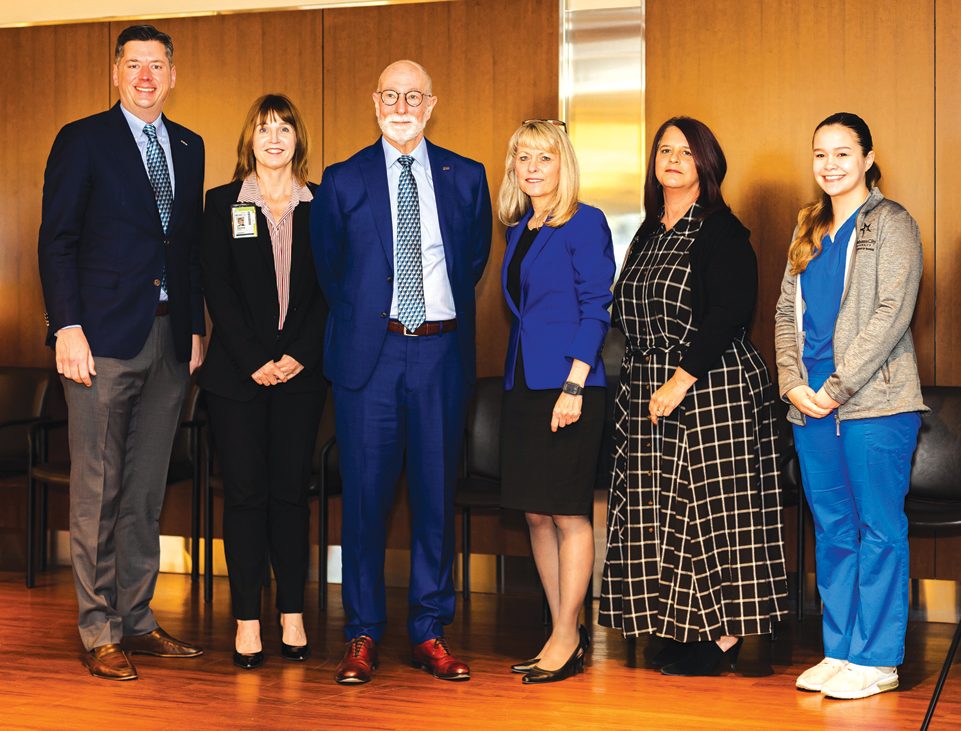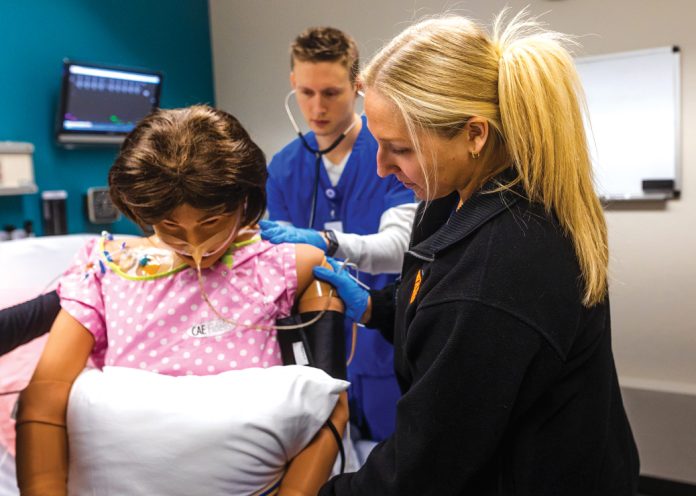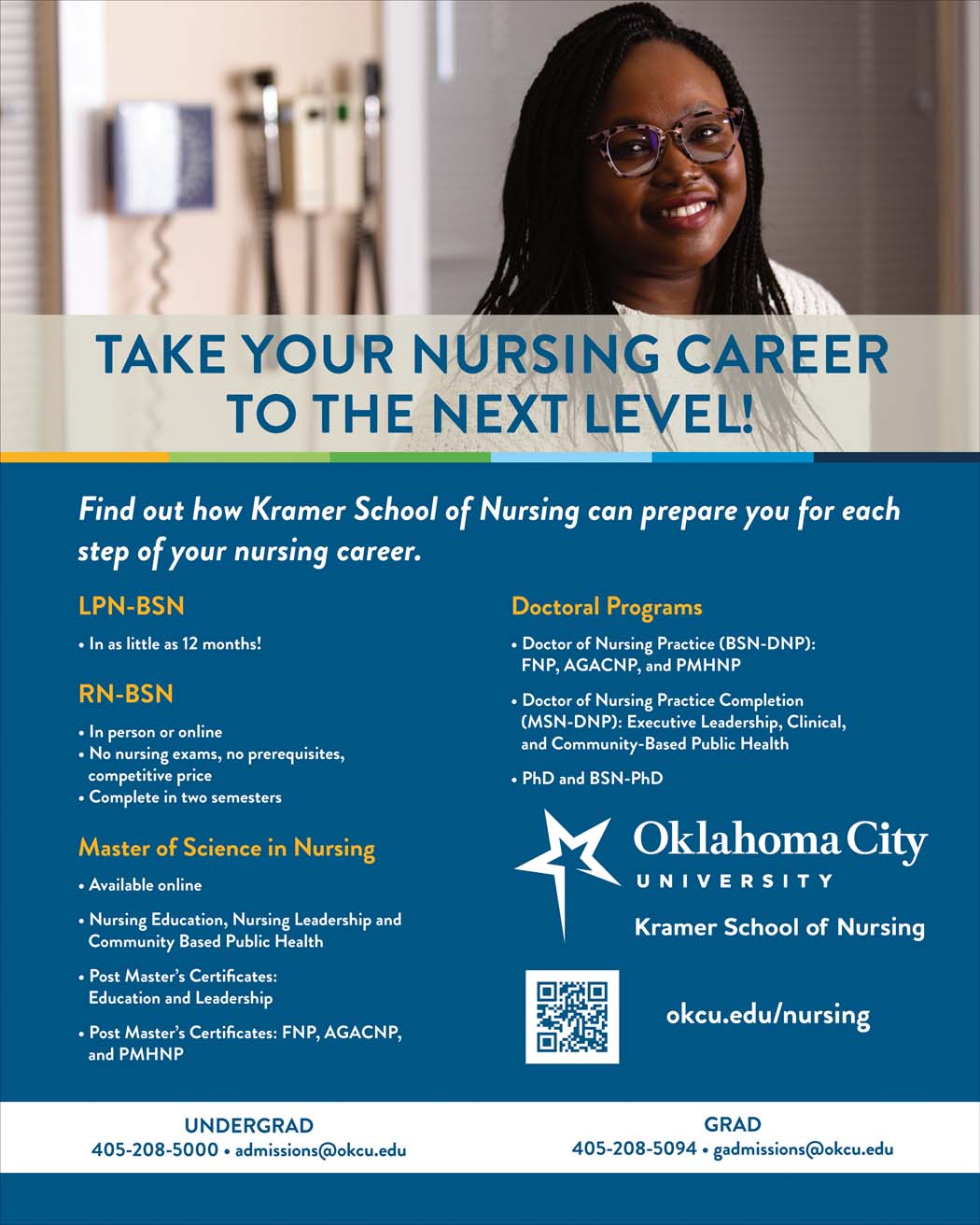
Oklahoma City University’s Kramer School of Nursing continues to implement opportunities that enhance the future of its students, staff and faculty.
One such venture is the Saints and Stars Partnership.
Saints and Stars is a five-year agreement between SSM Health St. Anthony Hospital and Oklahoma City University’s Kramer School of Nursing. The partnership allows OCU students to work part-time with SSM Health while they complete their nursing degree, while also receiving a $3,500 annual scholarship from SSM Health and a $5,000 annual discount from OCU.
In addition to employment and financial benefits, the partnership will allow OCU nursing students the opportunity to take part in clinical rotations at SSM Health; to engage in paid leadership clinical hours; to participate in a summer nurse extern program; to complete service-learning hours at SSM Health; and to be assigned a nurse mentor.
In addition, up to two SSM Health employees may enroll in OCU’s Master of Science in Nursing Education program. OCU will reciprocate by emphasizing the hiring of the program’s SSM Health graduates to serve as clinical adjuncts to supervise Stars and Saints students completing their rotations at SSM Health.
“As one of the nation’s leading nursing education programs, we are invested in helping address the nursing shortage,” OCU President Kenneth Evans said.
Casey Cassidy, PhD, RN, CMSRN, CHSE, Associate Dean & Associate Professor School of Nursing said the Saints and Stars program has gotten off to a good start.
“So far, really well, our students are just very appreciative of the financial assistance, but also the opportunity to, you know, gain more experience while they’re in,” Cassidy said.
The Kramer School of Nursing also focuses on Community Based Public Health which positions KSN to meet the future health care delivery needs of individuals within the context of population focused care. (story continued below)
Nurses interested in a Doctor of Nursing Practice degree with a Community Based Public Health (CBPH) focus are typically employed in non-acute care settings such as public health departments, school health settings, faith-based health programs, occupational health clinics, volunteer health organizations, community health centers, and out-patient care clinics.
These degrees are designed to provide advanced nursing education through the synthesis of nursing and public health theory applied to promoting and preserving the health of populations.
“We have a well-established Master of Science in Nursing (MSN) program and a Doctor of Nursing Practice program,” said Toni Frioux, DNP, APRN-CNP, FNP-BC, CNE.
Associate Professor School of Nursing.
Nurses with a CBPH focus are ideally positioned to help achieve prevention-oriented care by addressing: · The social determinants of health · Increasing access to care across the care continuum ·Engaging systems facilitators and identifying barriers ·Bridge delivery of health care needs in the community · Strengthen diversity among the nursing workforce
Frioux said the advanced CBPH leader will be provided the tools to improve the populations health to prevent problems from happening or recurring, limit health disparities, promote healthcare equity, quality, and accessibility by exploring the application of public health actions through nursing practice.
“There’s increasing awareness that we need to do something about the extensive amount of dollars that are spent in acute care, disease treatment at the end of life and, so we really need to change that paradigm where we are doing more health promotion and disease prevention services so that we are helping people maintain their health longer and keeping them out of those expensive hospital-based services to capitalize on saving dollars,” she said.
The Doctor of Nursing Practice, community based public health track is designed for advanced nurses with careers in non-acute care settings who already hold a master’s degree in nursing, master’s in public health, or similar master’s degree. The program is 32-credit hours.
Frioux said the Master of Science in Nursing degree with a CBPH focus is a good fit for nurses with a minimum of a bachelor’s degree who are interested in applying and integrating public health science into their nursing skill set to improve the health of the community and the population through out-patient practice settings.
Kramer School of Nursing’s Bachelor of Science in Nursing (BSN) and Doctor of Nursing Practice Adult-Gerontology Acute Care Nurse Practitioner (DNP-AGACNP) students collaborated with Doctor of Physical Therapy (DPT) students to care for a client in the acute-care setting while focusing on patient safety, teamwork, and communication.
In January 2023, the Kramer School of Nursing joined the Physician Assistant Program and Physical Therapy Program in viewing the OCU’s theater department performance.
After the performance, breakout sessions with students from all three departments were led in an interprofessional discussion.
“We had a great response, and we had over 100 students that participated,” Frioux said. “We had the theater students. In addition to that, who actually read the play. It just gave us an opportunity to introduce in a very different way some of the concepts that we have to deal with in healthcare.”
For more information visit: https://www.okcu.edu/nursing














